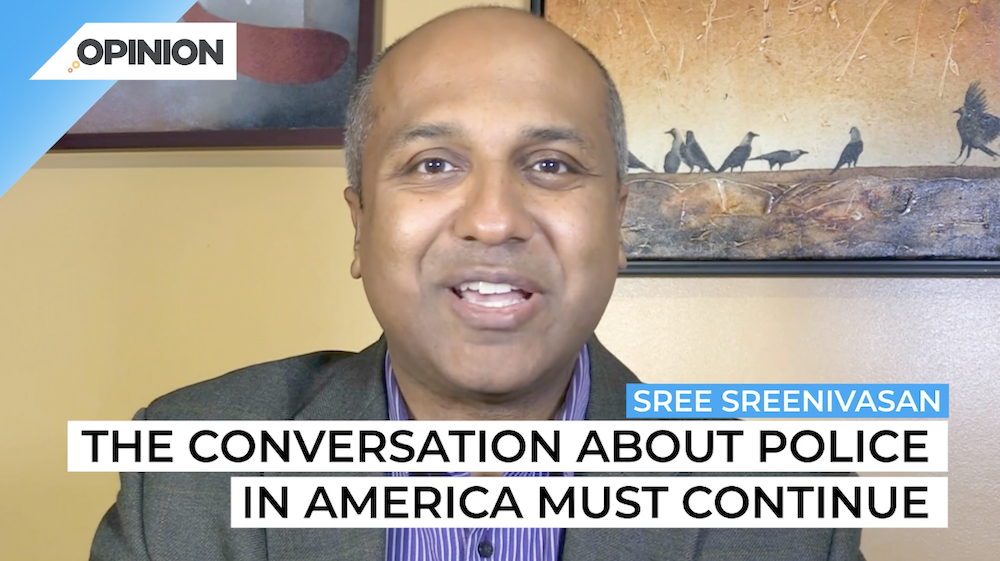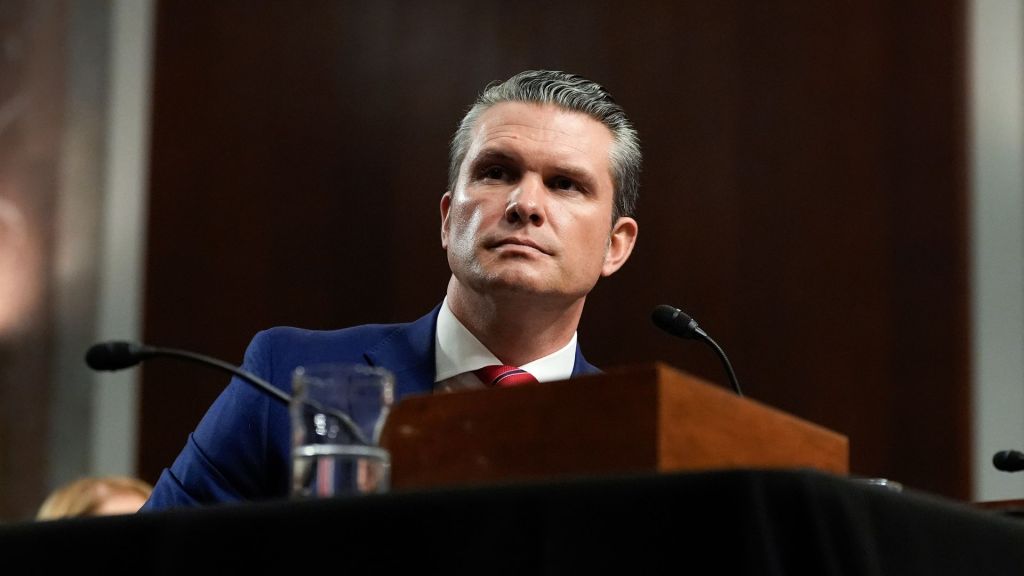
Commentary
-
Our commentary partners will help you reach your own conclusions on complex topics.
Hi, I’m Sree Sreenivasan. And I talk about politics, technology and more. Today, I’m going to share some thoughts on systemic racism in America, police violence, and what it means to talk about politics in this country.
I’ll first say I believe in good policing, have friends who serve and when I’m in trouble, I’m looking for the NYPD.
Conservative media has dined out on racial justice issues over the last 4 decades, but the last 4 years was a wholly different animal. Racism in America is alive and well, and we need to talk about its victims if we want to truly address it – and I want to go back to the story of George Floyd and what happened in Minnesota in the summer of 2020.
The police officer who killed George Floyd was found guilty, but it didn’t bring Floyd back, and it certainly did little to end police violence.
The trial was a telling snapshot of policing in America, and it didn’t paint a very rosy picture. I keep going back to the story of the original police report released by the Minneapolis PD after Floyd’s death,
This is a direct quote from the report:
Two officers arrived and located the suspect, a male believed to be in his 40s, in his car. He was ordered to step from his car. After he got out, he physically resisted officers.
Officers were able to get the suspect into handcuffs and noted he appeared to be suffering medical distress. Officers called for an ambulance. He was transported to Hennepin County Medical Center by ambulance where he died a short time later.
Nothing in the police report is technically untrue, but reading this and then seeing the video of the entire interaction would leave anyone scratching their head. Any time I see a report that includes “police say…” in it, I instantly apply a sort of mental asterisk to whatever comes next.
And what comes next is crucial, because there always seems to be a “next time.”
In Minnesota, “next time” came quickly. As the Derek Chauvin trial was coming to a close, police killed Daunte Wright. The officer who shot Wright claimed it was an accident, saying she thought her gun was a taser—which is somehow more absurd than the police descriptions of the George Floyd killing.
Police violence and broader systemic racism are in the political discourse like never before, and, in general, I view that as a good thing.
But, calling these issues “politics” or “political” does nothing but undercut and downplay the severity of this situation. It’s a cheap reaction that belies a lack of will to even begin to understand the issue of racism in America and the manifestations of that racism.
This sort of nihilism nearly tore the country apart on January 6.
Sure, politicians have a huge role to play in fixing things, but nothing about police violence strikes me as political in nature—we’re talking about a very fundamental part of how our society is set up. Communities need to be able to trust those charged with keeping them safe, it’s that simple.
Talking about police violence, systemic violence and how people of color are uniquely victimized by it is not talking about “politics,” it’s talking about the fabric of our society, and don’t let anyone tell you different.
-
Service industry workers deserve better treatment
Can you imagine how difficult the past two years would have been without the hard-working members of the service industry? I can’t. If those people hadn’t reported for duty to make deliveries, stock grocery shelves, and maintain the trains, trucks, and planes that our economy relies on so heavily, the pandemic would have been exponentially… -
Stop playing around, podcast platforms. You’ve got work to do!
Social media giants are under more pressure than ever to clean up their content, but what about podcast platforms like Apple, iHeart Radio, Spotify, and more? We’ve seen congressional hearings, countless investigative reports, and leaked documents pointing to the ill effects of big social media on all aspects of society, and I’ve talked about what we… -
We should all be a little more “woke”
To conservatives, there is no four-letter word more vile or offensive than “woke”. The mere mention of it agitates right-wing media to the point where they will waste a good portion of their on-air time ranting against the “Radical Left” and its “woke” agenda. Black Lives Matter and all-gender bathrooms are just two of the… -
Big Tech must do better
Big Tech is failing us in a big way. Companies like Facebook, Amazon, and Google launched with enormous goals and plans to change the world, and in many cases, they have, but the pandemic has shown us the true colors of these tech giants. Yes, technology kept the world turning on many levels as Zoom… -
The moral failings of the anti-vaxx movement put everyone at risk
One of the most damaging consequences of the pandemic is the supercharged anti-vaxx movement. Anti-vaxxers used to occupy a small corner of society most rational people dismissed, due to willful ignorance and stubborn refusal to accept the results of careful scientific process. However, COVID-19 and the subsequent vaccines that have allowed us to safely resume…
Latest Opinions
-
 Reuters
Reuters
US officials to press Ukraine on peace talks in Saudi Arabia meeting Tuesday
-
 Reuters
Reuters
Canada’s next prime minister vows to win trade war with US
-
 Getty Images
Getty Images
Billions of cicadas emerge in 13 states this spring
-
 Getty Images
Getty Images
Mark Carney to succeed Justin Trudeau as head of Canada’s Liberal Party
-
 Getty Images
Getty Images
DHS sees leadership shakeup amid ICE operation leaks
Popular Opinions
-
In addition to the facts, we believe it’s vital to hear perspectives from all sides of the political spectrum.






